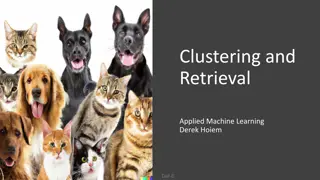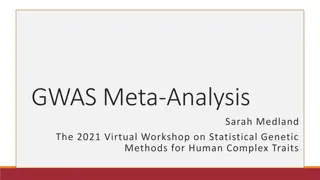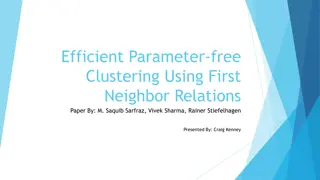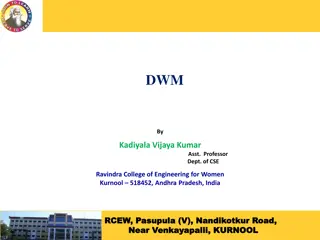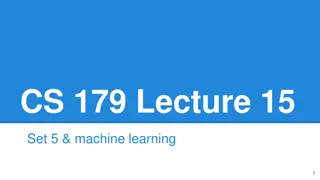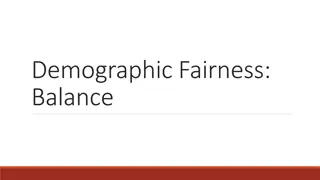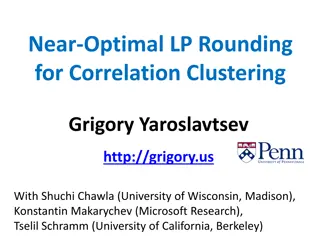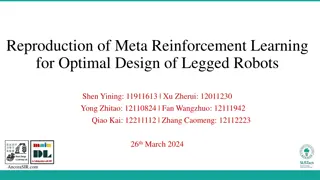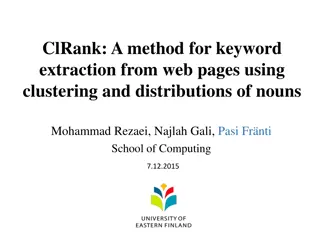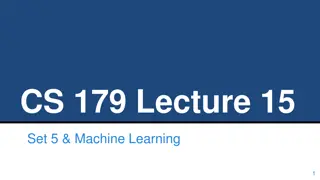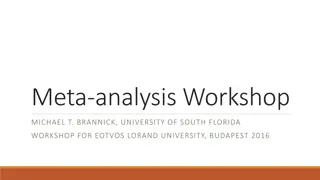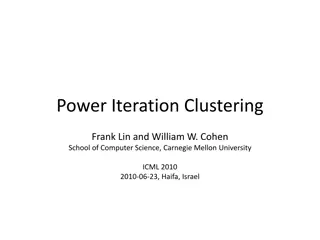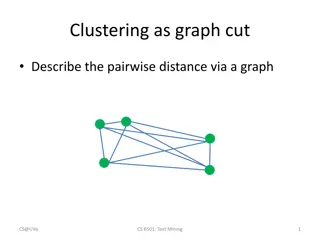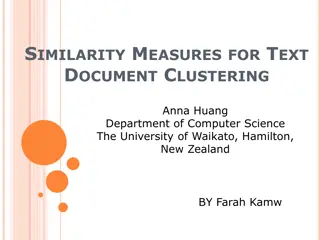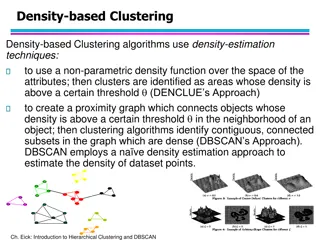Introduction to Meta-analysis in Stata
This workshop, presented by Dr. Christine R. Wells from UCLA, provides an in-depth exploration of meta-analysis in Stata. Participants will learn about systematic reviews, data collection and organization, running meta-analyses, interpreting results, creating graphs, and identifying biases. The focu
6 views • 181 slides
Clustering Algorithms: K-means and Hierarchical Clustering
Explore the concepts of clustering and retrieval in machine learning, focusing on K-means and Hierarchical Clustering algorithms. Learn how clustering assigns labels to data points based on similarities, facilitates data organization without labels, and enables trend discovery and predictions throug
1 views • 48 slides
Meta-Analysis in GWAS: Methods and Applications
Meta-analysis in GWAS involves combining data across studies to estimate overall effects, explore cohort differences, improve power, and replicate findings. It includes joint vs. meta-analysis, methods, and types such as fixed effect and random effect meta-analyses.
16 views • 20 slides
Text Analytics and Machine Learning System Overview
The course covers a range of topics including clustering, text summarization, named entity recognition, sentiment analysis, and recommender systems. The system architecture involves Kibana logs, user recommendations, storage, preprocessing, and various modules for processing text data. The clusterin
1 views • 54 slides
Efficient Parameter-free Clustering Using First Neighbor Relations
Clustering is a fundamental pre-Deep Learning Machine Learning method for grouping similar data points. This paper introduces an innovative parameter-free clustering algorithm that eliminates the need for human-assigned parameters, such as the target number of clusters (K). By leveraging first neigh
4 views • 22 slides
Clustering Methods for Data Analysis
Clustering methods play a crucial role in data analysis by grouping data points based on similarities. The quality of clustering results depends on similarity measures, implementation, and the method's ability to uncover patterns. Distance functions, cluster quality evaluation, and different approac
2 views • 8 slides
Text Vectorization and Clustering in Machine Learning
Explore the process of representing text as numerical vectors using approaches like Bag of Words and Latent Semantic Analysis for quantifying text similarity. Dive into clustering methods like k-means clustering and stream clustering to group data points based on similarity patterns. Learn about app
5 views • 25 slides
Achieving Demographic Fairness in Clustering: Balancing Impact and Equality
This content discusses the importance of demographic fairness and balance in clustering algorithms, drawing inspiration from legal cases like Griggs vs. Duke Power Co. The focus is on mitigating disparate impact and ensuring proportional representation of protected groups in clustering processes. Th
5 views • 36 slides
Clustering Algorithms in Data Science
This content discusses clustering algorithms such as K-Means, K-Medoids, and Hierarchical Clustering. It explains the concepts, methods, and applications of partitioning and clustering objects in a dataset for data analysis. The text covers techniques like PAM (Partitioning Around Medoids) and AGNES
3 views • 74 slides
Correlation Clustering: Near-Optimal LP Rounding and Approximation Algorithms
Explore correlation clustering, a powerful clustering method using qualitative similarities. Learn about LP rounding techniques, approximation algorithms, NP-hardness, and practical applications like document deduplication. Discover insights from leading researchers and tutorials on theory and pract
3 views • 27 slides
Reproduction of Meta Reinforcement Learning for Optimal Design of Legged Robots
Our project aims to reproduce the Meta Reinforcement Learning process for optimal design of legged robots, focusing on understanding robot design parameters, algorithms, and optimization. We will explore Markov Decision Process (MDP), Model-Agnostic Meta-Learning (MAML), and design optimization tech
3 views • 9 slides
Introduction to NLP Text Clustering
In this content, you will explore the concept of text clustering in Natural Language Processing (NLP). The material covers different clustering techniques such as exclusive and overlapping clusters, hierarchical versus flat clusters, and the cluster hypothesis. It elaborates on practical application
3 views • 17 slides
Hierarchical Clustering
- Hierarchical clustering is a versatile technique in data mining that creates a hierarchical decomposition of objects based on similarity or distance measures. This clustering method offers insights into data relationships through dendrograms, allowing for the identification of outliers and the exp
3 views • 36 slides
Correlated Histograms Clustering
Correlated Histograms Clustering is a novel unsupervised learning technique that utilizes underlying statistics of a dataset across multiple dimensions to identify cluster centroids. This approach is effective for identifying cluster patterns in unlabeled or noisy data, offering insights into the da
0 views • 18 slides
ClRank: A Method for Keyword Extraction Using Clustering and Distributions
ClRank is a method designed for extracting keywords from web pages by utilizing clustering and distributions of nouns. The process involves text extraction, pre-processing, POS tagging, lemmatization, similarities comparison, clustering, and ranking. The effectiveness of clustering in keyword select
3 views • 10 slides
Building Machine Learning Systems with Overlapping Computation and Data Movement
Dive into the practice of overlapping computation with data movement on streaming workloads while constructing a machine learning system. Explore clustering, latent semantic analysis, bag of words approach, k-means clustering, and stream clustering to understand text representation, similarity quant
1 views • 38 slides
Innovative Clustering Algorithms and EIC Recon Integration
The update from UConn-RIKEN highlights discussions with UC Riverside on clustering approaches for separating particles. The meeting explored low-level topological clustering alongside high-level GNN (ML) clustering. Challenges in distinguishing photons from neutrons were addressed, emphasizing the n
2 views • 5 slides
Advanced Cluster Analysis Methods in Data Discovery
Explore advanced methods in cluster analysis with Antoni Wibowo. Learn about model-based clustering, fuzzy clustering, probability-based clustering, self-organizing map, and handling high-dimensional data. Dive into key concepts like fuzzy function modeling and soft versions of K-means clustering fo
4 views • 60 slides
Meta-analysis Workshop by Michael T. Brannick - University of South Florida 2016
Explore the meta-analysis workshop conducted by Michael T. Brannick at the University of South Florida in 2016. The workshop covers datasets, open software, steps in meta-analysis, research questions, pros and cons of meta-analysis, and focuses on the research question related to exercise as a treat
2 views • 49 slides
Cluster Document Clustering Techniques
Explore the concepts of flat clustering and hierarchical clustering, which involve grouping documents into coherent and distinct subsets. Learn the importance of clustering algorithms, distance measures, and the benefits of clustering in information retrieval.
4 views • 34 slides
Meta-Analysis in GWAS: Methods and Applications
Explore the world of Meta-Analysis in Genome-Wide Association Studies (GWAS) through topics like combining data across studies, joint vs. meta-analysis, and types of meta-analysis. Dive deep into fixed and random effect models, how meta-analysis is used in GWAS, and its significance in estimating ov
4 views • 23 slides
Power Iteration Clustering - Fast and Cost-Effective Method for Spectral Clustering
Discover how Power Iteration Clustering offers a quick and affordable alternative to traditional spectral clustering methods. Learn about its efficiency, performance results, and comparisons with other techniques like Normalized Cut and NJW. Explore the potential of PIC in optimizing clustering proc
3 views • 123 slides
Advanced Clustering Techniques: Beyond K-means and EM Clustering
Explore advanced clustering techniques beyond K-means, such as EM Clustering, to address the limitations of traditional algorithms. Discover how EM Clustering handles data with ellipsoidal clusters and utilizes soft clustering methods for improved accuracy and flexibility in cluster assignments.
4 views • 56 slides
Clustering in Information Retrieval
Explore the concept of clustering in information retrieval, the process of grouping documents into clusters of similarity. Learn about the benefits of clustering for search applications, user interface enhancement, and visualization of document collections. Discover the differences between classific
1 views • 71 slides
Clustering Techniques for Data Analysis
Explore the world of clustering in data analysis through K-means clustering, gene expression analysis, and derivative clustering. Learn about Lloyd's algorithm, computational problems, and pseudo-pseudocode for organizing data into clusters efficiently. Dive into the visual representation of data wi
0 views • 9 slides
Comparing Clustering Algorithms and Distance Metrics in Machine Learning
Explore the k-means clustering algorithm and other prominent techniques in machine learning. Dive into the similarities, differences, advantages, and disadvantages of algorithms like k-means++, canopy clustering, and farthest-first clustering. Learn about essential distance metrics such as Euclidean
21 views • 8 slides
K-Means Clustering: A Simple Partitional Approach
K-means clustering is a fundamental partitional clustering method where each cluster is associated with a centroid and each point is assigned to the cluster with the nearest centroid. This algorithm requires specifying the number of clusters (K) and choosing initial centroids, which can impact the c
0 views • 18 slides
Pairwise Distance and Graph-Based Clustering Overview
Explore the concept of clustering through graph cuts and pairwise distances. Understand how clustering can be achieved via graph cuts and the implications of cutting based on class or cluster labels. Learn about external validation and the k-means clustering algorithm. Dive into partitional clusteri
2 views • 40 slides
Advanced Clustering Methods Overview and Implementation Techniques
Explore a comprehensive guide to advanced clustering techniques such as K-means, Hierarchical clustering, DBSCAN, and Spectral clustering. Learn about their advantages, limitations, and practical applications through DIY implementation. Discover the relationships between K-means, PCA, and LDA, along
2 views • 16 slides
Clustering and Classification in Data Analysis
Dive into the world of clustering and classification techniques in data analysis. Explore methods of density estimation, hierarchical clustering, and approaches to clustering algorithms. Understand how clustering plays a crucial role in determining clusters for semiparametric and nonparametric estim
0 views • 35 slides
Radial Basis Function Neural Network and Clustering Overview
A detailed overview of Radial Basis Function Neural Network (RBF) and clustering techniques. Explore the use of Gaussians as basis functions, linear least squares with basis functions, and the performance of RBF networks with large datasets. Understand the concept of clustering in unsupervised learn
11 views • 23 slides
Text Document Clustering: Similarity Measures and Document Representation
Exploring similarity measures for text document clustering, this paper analyzes the effectiveness of distance functions in partitional clustering. The study compares various measures using the K-means algorithm on different text document datasets. Document representation involves term frequency-weig
3 views • 21 slides
Text Classification and Clustering Methods Overview
Explore text classification and clustering methods in this comprehensive lecture covering topics such as supervised vs. unsupervised learning, clustering techniques, similarity measurement, and more. Understand the difference between soft and hard clustering, hierarchical vs. non-hierarchical cluste
3 views • 19 slides
Practical K-Means Clustering with Image-based Visualization
Explore K-Means Clustering through practical examples using R programming. Visualize clustering results with scatter plots and understand the clustering process step by step. Improve your understanding of clustering algorithms with real-world data analysis.
0 views • 14 slides
Density-Based Clustering Algorithms and DBSCAN Overview
Learn about density-based clustering algorithms utilizing density estimation techniques like DENCLUE and DBSCAN. Understand the concept of core, border, and noise points in DBSCAN for efficient clustering. Stay informed about upcoming tasks and lectures related to hierarchical clustering and cluster
2 views • 32 slides
Understanding K-Means Clustering: A Comprehensive Guide
Learn about K-means clustering, a popular partitional clustering approach that groups data points into clusters based on centroids. Explore the K-means clustering problem, common definitions, complexity, algorithm, initialization, and more. Discover how K-means clustering works and its applications
5 views • 23 slides
Multi-view Clustering and Evaluations Explained
Discover the significance of multi-view clustering, its advantages over single-view clustering, and explore various frameworks and algorithms used in multi-view clustering for tasks like detecting deceptive reviews and spectral clustering. Dive deeper into Linked Matrix Factorization and Multi-view
3 views • 9 slides
Understanding Meta-Causation in Consciousness by John Barnden
Explore the intriguing concept of meta-causation in consciousness as presented by John Barnden, an Emeritus Professor of AI. Delve into the argument that meta-causation is a necessary condition for pre-reflective auto-sensitivity in consciousness, backed by a radical and novel claim. Gain insights i
2 views • 30 slides
Understanding Data Modeling and Meta Models
Dive into the world of data modeling and meta models, exploring concepts such as three layers of meta model, domain-specific ontology, and instance models. Learn about the comparison between different meta models and their implementations in Excel, JSON Schema, and RDF/SHACL.
1 views • 41 slides
Understanding Clustering in Data Analysis
Clustering is a vital tool used across various fields like social sciences, biology, astronomy, and computer science to analyze large datasets. Despite its increasing popularity, the abstract nature of clustering and the lack of consensus on its definition pose challenges. The ambiguity in clusterin
1 views • 64 slides

